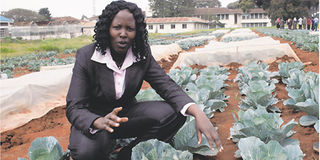Crops spend the night under mosquito nets

Photo/WILLIAM OERI/NATION
Graduate student Judith Jeptoo demonstrates at Kenya Agricultural Research Institute (Kari), Nairobi on July 5, 2011 how bed nets laced with insecticides can be used to trap and kill common pests that destroy crops.
Two years ago, residents of Kisii South were using old mosquito nets as fences to prevent chicken from straying into neighbours’ homes.
In parts of Nyanza it was used for fishing, while some people at the Coast rejected the nets, claiming the nets were talking at night.
Another set of businessmen used the nets to make wedding dresses. But local agricultural researchers have now found another use of the mosquito net — pest control.
Research now underway at the Kenya Agricultural Research Institute (Kari) shows that a modified form of the mosquito net can used to protect cabbage plants from aphids and caterpillars.
Traditionally, bed nets are used to trap and prevent mosquitoes from biting human beings and infecting them with malaria, a deadly tropical disease.
Dr Lusike Wasilwa, an assistant director in charge of horticulture and industrial crops at Kari, says the initiative could be the most effective method of pest control on cabbages and tomatoes.
“For a long time, farmers have assumed that the only effective way of pest control is to increase the dose of a pesticide or to increase the frequency of spraying crops, but now comes an easier way of pest control,” Dr Wasilwa said.
Healthy crops
“Covering plants between 5pm and 9am for three days is the most effective way to get healthy crops,” she told the Nation at Kari on Tuesday.
The net is removed during the day when the flight activities of pests are reduced and to suppress the problems of overheating and excessive shade; both problems are experienced with insect-proof screens under tropical conditions.
Ms Judith Jeptoo, a Masters student at Chepkoilel University Campus, who is also carrying out the study at the Kari field, warns that some of the pesticides used for pest control are often hazardous affecting users and the environment.
Cabbages are one of the most important cash crops in Africa, but attract a wide range of pests leading to loss of yield.
The research at Kari that so far promises to provide solutions to the pests menace is being done by four students studying entomology at Chepkoilel and Kenyatta University.
The research on reducing pests and improving micro-climate for small-scale vegetable production in Africa hopes to demonstrate that simple technology can be used to protect high-value crops.
The technology has also been tested in Benin by Cirad, a French team, where farmers were cynical at first but later realised better harvests.
The Benin study revealed that cabbage harvests were higher for those that had been covered.
The technology was developed through the partnership of World Health Organisation, A to Z Textile Mills and Sumomoto of Japan in an initiative dubbed Vector Health International.
Kari is set to enhance the expertise and set up trials in Kenya.




